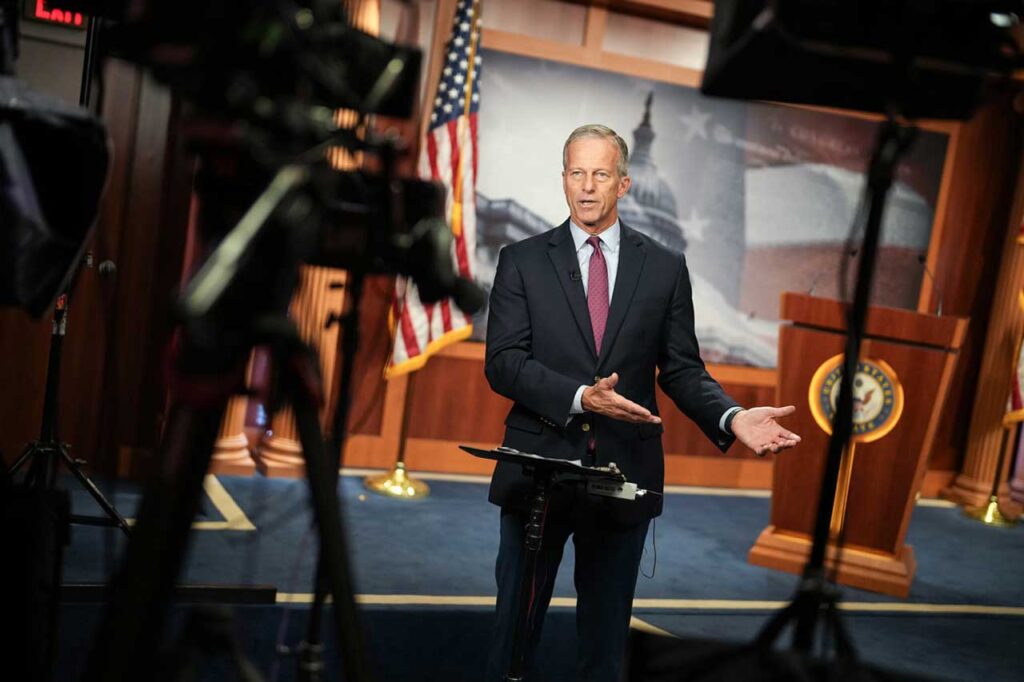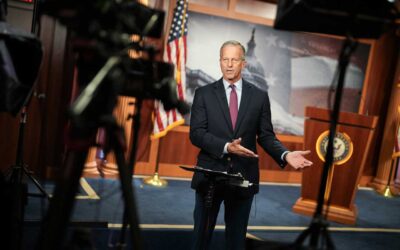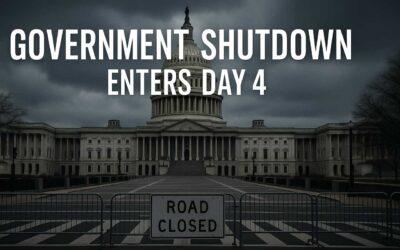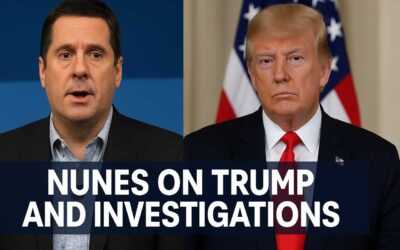Senate Majority Leader John Thune on the Government Shutdown Stalemate: A Path Forward?

In an exclusive interview on Sunday Morning Futures with host Maria Bartiromo, Senate Majority Leader John Thune (R-SD) laid bare the frustrations surrounding the ongoing government shutdown. With funding deadlines looming and the public bearing the brunt of the impasse, Thune emphasized that resolution lies in the hands of Democrats, who have repeatedly blocked a straightforward funding bill. As procedural votes approach on Monday, Thune revealed ongoing backchannel talks and urged “reasonable Democrats” to break ranks with leadership. Here’s a breakdown of the key insights from the discussion.
The Stalemate: Four Rejections and Counting
Thune described the negotiations as a “stalemate,” with little room for compromise unless Democrats prioritize reopening the government. The Senate has voted four times on a clean, bipartisan continuing resolution (CR) to fund operations for the next seven weeks—a measure already passed by the House and ready for President Trump’s signature. Each time, Democrats have rejected it, forcing another vote on Monday at 5:30 p.m.
“It’s simply, are the Democrats going to open up the government, or aren’t they?” Thune said, framing the impasse as a deliberate tactic. He attributed the shutdown to Senate Minority Leader Chuck Schumer (D-NY), calling it a “Schumer shutdown” driven by pressure from far-left interest groups. Analysts predict the closure could drag on for weeks, but Thune insisted its duration hinges on Democrats: “It’s just as long as the Democrats want it to go on.”
Democrats’ Demands: A “Nonstarter” Proposal
At the heart of the deadlock is the Democrats’ push to attach sweeping policy changes to the funding bill. Thune detailed their proposal as including $1.5 trillion in new spending, expanded free health care for noncitizens, and cuts to a $50 billion rural hospital fund—demands he dismissed as “not serious,” “not reasonable,” and “not realistic.”
“Everybody knows that,” Thune remarked, arguing that these additions hijack a routine, nonpartisan process meant to buy time for full appropriations. He contrasted this with past practices under Democratic majorities, where short-term CRs were routine—enacted 13 times during the Biden administration without gimmicks. Thune warned that tying unrelated issues to funding only prolongs the pain, leaving essential services in limbo.
The Vote Math: Seeking Five Key Democrats
With 55 Republican senators already on board, the Senate needs 60 votes to overcome a filibuster—requiring just five Democrats to flip. Thune noted two have already crossed the aisle, including Sen. John Fetterman (D-PA), who appeared on the show the previous weekend. “Have you identified five more?” Bartiromo pressed.
Thune confirmed “conversations ongoing” with Democrats who view the shutdown as a “losing strategy” and a “dead end.” He described these as off-ramp discussions, though he cautioned that Democratic leadership remains “stuck” due to “Trump derangement syndrome” from left-wing groups unwilling to hand the president any wins. “This is not giving him a victory,” Thune clarified, stressing that the CR is merely a temporary bridge to appropriations.
He expressed optimism that “reasonable Democrats” would prevail over Schumer’s lead, urging rank-and-file members to prioritize constituents over party loyalty. “This is where you need to separate from your leader and actually do the right thing,” he said.
Potential Compromises: Obamacare Subsidies and Beyond
Bartiromo raised a proposal from Sen. Mike Rounds (R-SD) to extend Obamacare subsidies for one year, followed by a phase-down to pre-COVID levels. Thune welcomed ideas like this but drew a firm line: “Those are all ideas we can talk about, but not while the federal government is being held hostage.”
He highlighted the program’s flaws—describing it as “desperately in need of reform” due to poor taxpayer returns and insurance companies “gaming” it by enrolling unaware individuals. Thune reiterated that all substantive talks, including on enhanced subsidies, must wait until funding is restored. “Open up the government—or else,” he summarized the ultimatum.
National Security and Broader Impacts: Real-World Consequences
As the shutdown stretches, Thune warned of escalating risks to national security and public safety. Unpaid troops, Border Patrol agents, and TSA screeners could compromise defenses, while programs like food assistance for women and children face disruptions. The administration is already reallocating funds, forcing tough prioritization decisions that will “costly to the American people.”
Beyond security, the impasse halts critical work: a defense authorization bill, appropriations, and permitting reform are all stalled. Thune lamented the lost productivity, noting the Senate has devolved into a “personnel department” bogged down by Democratic filibusters on Trump’s nominees. To counter this, Republicans changed Senate rules to process nominees in batches— with 100 more votes slated for Tuesday—streamlining what was once routine unanimous consent.
Thune decried the Democrats’ “new business model” of taking “everything hostage” out of “hatred for the president,” calling it “irrational” and “pathological.” He tied this to a broader “breakdown in trust,” as reported by The Wall Street Journal, questioning Schumer’s grip on colleagues amid internal “robust conversations.”
A Glimmer of Hope: The Hamas Hostage Deal
Shifting to foreign policy, Thune praised President Trump’s diplomatic push on the Israel-Hamas conflict. Envoys Steve Witkoff and Jared Kushner are headed to Egypt to finalize a 20-point hostage-release proposal, accepted with reservations by both sides. “I’m hopeful,” Thune said, crediting the administration for engaging Israel and regional neighbors.
Skeptical of Hamas’s intentions—citing their charter’s aim to “eliminate and wipe out Israel”—Thune stressed the need for disarmament. Still, he urged giving Trump “great credit” for pursuing peace, potentially leading to the “elimination and obliteration of Hamas and Hezbollah.”
Looking Ahead: Deadlines, Discomfort, and the Next Deadline
What could break the logjam? Thune pointed to mounting discomfort: constituents feeling the pinch, especially with open enrollment for insurance starting November 1. The current CR deadline hits mid-November, but by then, Thune hopes progress on three conference bills will rebuild momentum for transparent appropriations—contrasting Schumer’s past “behind closed doors” approach.
“Eventually everybody starts feeling it,” he predicted, adding that Democrats will have “another chance” to wield leverage then. For now, the message is clear: Reopen the government to unlock everything else. As Monday’s votes loom, all eyes are on whether five Democrats will heed the call—or if the shutdown’s toll will force their hand.























